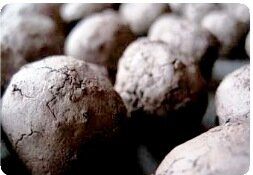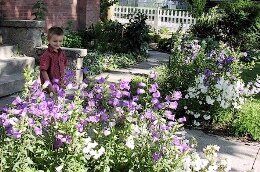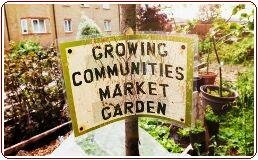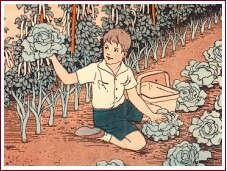Reflecting on Nature
Sustainable Green Gardening and Eco Friendly Living

By three methods we may learn wisdom: first, by reflection which is noblest; second, by imitation, which is the easiest; and third, by experience, which is the bitterest.
~ Confucius (551-479BC).
When you practice eco-friendly sustainable gardening, it can often provide profound insight into other areas of our lives. Soul gardening anyone?
Our mind may be stilled as we reflect what is happening in our garden and our world.
Here is a collection of articles, ideas, facts and fiction on living sustainably and green gardening.
Reflections on Nature goes deep...
Garden Facts & Fiction

Fake facts, fiction... forsooth, whats the truth!
What's going on in the plant world, and can you trust a cucumber to stay a cucumber — or will it become a berry overnight? Read some confounding, eye-opening botanical blather here... Garden Facts & Fiction
The Carbon Cycle

Every living thing contains carbon.
To protect our earth, we need to protect the balance of carbon in the grasslands, forrests and our own gardens. See why here... The Carbon Cycle
Guerilla Gardening with Seed bombs, Seedballs and Mudballs

An ancient idea for growing plants without digging or tilling.
Fancy a spot of making and hurling little hard lumps of clay? It's fun and astonishingly satisfying. How? Let me count the ways... read more at Guerilla Gardening with Seed Bombs
Taking the Chore Out of Gardening

What, you don't like gardening!
There's watering to do, leaves and mess to clean up, dead plants to replace. It's never ending and hard work?
Quickly, follow these tips to save time, money and effort... you'll soon be appreciating your garden and relaxing more. Take a break and read Enjoyable Gardening
Principle 33 and Eco Green Living

Have you heard of Principle 33?
Simply put, it requires that you make everything you touch of the very highest quality you can afford.
I was reminded of this when visiting a friend and her trowel broke. Tossing it out, she said that wasn't the first time it has happened.
So why do we buy cheap stuff? Why is the world awash with broken plastic buckets for goodness sake.
In the old days, sorry, we had long lasting enamel basins and stainless steel buckets. Yes I have plastic stuff of course; and I have one really good quality bucket which has such a strong, comfortable handle that I am not going to ever buy an el cheapo again.
Same with garden tools, toys and household items.
Read more on this principle on Judy's excellent website; her article on Living Well covers it nicely.
How Much Food is Wasted Each Year?
And what else goes into the trash bin? See what an average family does with its trash: Waste and Recycling Trash
Allotments and Community Gardens

Allotments are back in fashion... beautiful, simple idea...grow your own even if you don’t have a backyard. There are waiting lists I hear; but what secrets lurk in the darkness? Poison, fraud, misplaced boots 'n more! These people don’t sound like true treehuggers, okay, gardeners to me... stealth on over to: Losing the Plot
Home Grown Vegetables

See this interesting map of USA showing regional home gardening areas today, who gardeners are, what they do, what it costs and more.
Then go back in time to England 1000 years ago: From Robert Lacey's book "The Year 1000," ...The fruits and vegetables were certainly more tasty than modern equivalents, but like the livestock of the year 1000, they were considerably smaller — as archaeologists have discovered from the pips and seeds found in ancient sites. Delve into more: Home Grown Vegetables
Converting to organics
Many farmers and gardeners who practise conventional growing with tilling, chemicals and monoculture are either stuck in inertia or too stubborn to change to a more sustainable way.
Why is this? Can they manage the transition? Will their plants, crops and animals suffer? Is the biggest hurdle in their heads? Read more here: Converting to Organics
Artificial fertilisers
What is one of the reasons for the scary scenario of fish supplies dwindling and finally collapsing in roughly 40 years time?
The prediction is there will be too many people and too little fish. Are lethal runoffs from chemicals to blame? Would sustainable farming make a difference? Find out about Artificial Fertilizers here.
Vertical Gardens
Will gardening vertically help save the world? Read more about Vertical Gardens here.
Genetically engineered words

The Washington Post's Mensa Annual Invitational asks readers to take any word from the dictionary, alter it by adding, subtracting, or changing ONE letter, and supply a new definition. From the long list of winners, here are a few that could apply to organic gardeners:
# Decafalon (n): The grueling event of getting through the day consuming only things that are good for you.
# Arachnoleptic fit (n): The frantic dance performed just after you've accidentally walked through a spider web.
# Beelzebug (n): Satan in the form of a mosquito, that gets into your bedroom at three in the morning and cannot be cast out.
# Caterpallor (n): The color you turn after finding half a worm in the fruit you're eating.
But... Q. What's worse than finding a worm in an apple?
A. Finding half a worm.
The world digs the no-dig gardening way
Did you know that no-till (farming version of no-dig), organic soil can sequest CO²?
It's the secret solution to global warming, and this land based carbon cycle works like this: Carbon is taken out of the atmosphere by plants and converted to organic matter through photosynthesis. The oxygen in the molecules is released back to the air and the carbon becomes part of the plants' structure and eventually the soil.
Have a look at this 30-year comparable study by the Rodale Institute in Pennsylvania, US. It clearly demonstrates that land farmed organically through methods like no-till and winter cover crops, absorbs 30% more CO² than conventionally farmed land; retains soil organic matter; protects crops against weather fluctuations and improves yields over time. It's all documented here
We can learn from the bees and ants
A single ant or bee isn't smart, but their colonies are. The study of swarm intelligence is providing insights that can help humans manage complex systems.
In fact, almost any group that follows the bees' rules will make itself smarter, says James Surowiecki, author of 'The Wisdom of Crowds'.
Ants too, look confident, like they have a plan and know where they are going. But ants aren't clever little engineers, architects, or warriors after all — at least not as individuals. When it comes to deciding what to do next, most ants don't have a clue.
How do we explain then, the success of Earth's 12,000 or so known ant species? They must have learned something in 140 million years.
Read more on: The Genius of Swarms.
Vegetable Nutrition
There is an assumption that if we eat up all our vegetables, we will be receiving enough vitamins and minerals necessary for good health.
Maybe, maybe not. A UK study has shown a decline in mineral values of store bought vegetables of approximately 40% since the 1930's and 1940's.
Here's the article and a compelling exchange I had with Matthew Adams of the Good Gardeners Association UK, on Vegetable Nutrition.
Gardening by the Moon
 Can the phases of the moon really impact on how well your garden grows?
Can the phases of the moon really impact on how well your garden grows?
According to many people, yes. The phases of the moon affect the oceans and even the behaviour of people... so why not your plants? Read more Gardening by the Moon.
Science Can Explain Everything!
You will know that as you reflect on the world around you, some things seem hard to explain in purely scientific terms. Armies of scientists and researchers swarm in labs around the world solving the mystery out of every bit of wonder we witness.
This article looks at plant dowsing in the vegetable garden. Why for goodness sake would believers believe in Plant Dowsing?
Jeannie's Garden
A friend of mine, who lives on the outskirts of Melbourne Victoria (Australia) is a committed eco-gardener. She walks the walk AND talks the talk. So I was interested when she recently wrote to me about her gardening efforts.
"I'm finally making some progress on the garden. This house sits on an acre of land and I wondered how I would ever tame it..."
This is a simple and uplifting story about how one woman is making a difference in her neighbourhood using no dig gardening methods. Read it here
Ecological Gardening
Time to reflect, for just a moment, what we're doing growing organic vegetables and where it fits into the scheme of things.The organic gardening movement has been going since the 1920's and really, it's about remembering how we used to farm food before we discovered chemical fertilisers, pesticides and preservatives.
A sense of powerlessness can paralyse if a problem seems too large. YOUR vegetable patch DOES make a difference. So just what is Ecological Gardening?




